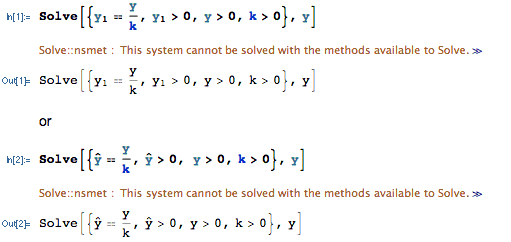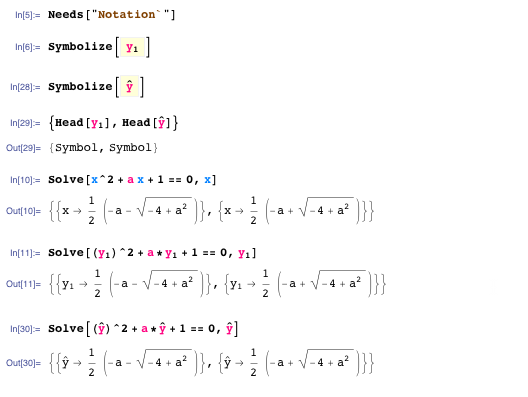The way Solve works has changed in v9 ... in essence, to get the answers that one obtained under v8, one now often has to specify a lot more information about all the variables and parameters, in order to get the desired neat solution.
In providing this extra detail on Input, across the board, so to speak, I have discovered that, rather unfortunately, the Solve function has a poor understanding of notational forms such as Subscript, Superscript, OverBar, OverHat, OverDot, OverTilde etc etc ... causing Solve[] to fail on even the simplest examples when such notation is used.
As a quick illustration:

... when, of course, Mathematica can trivially solve such examples.
Two clarifications on the above:
The solution here is certainly not to use the Notation package ... I must confess that the point of the latter has mostly escaped me, because the very beauty of using Subscript etc notation in Mathematica is to be able Thread or Map over the index etc ... essentially getting the best of both worlds: a wonderfully flexible symbolic structure, even if not strictly a Symbol. The Notation package, by contrast, does the opposite ... by symbolising the structure, all flexibility is lost.
Some years ago, back in the days of Mathematica 3 or 4, a very similar issue occurred with Integrate when using Subscript notation ... causing it to fail horribly when certain Subscript variables were used on Input. And there were problems with Plot when using Subscript notation too. I recall raising these issue at the time, and if I recall correctly, these issues ... which effect the way thousands of people use Mathematica on a daily basis, were rectified in subsequent revisions of mma. It would be very helpful if a similar fix was adopted for the Solve case, so that Solve was aware that Subscript[y,1] is not the same as say Sin[y] ... That Subscript[y,1] notation does not denote a mathematical function of y ... but rather just denotes a typesetting function of y.
Do others have thoughts as to whether this behaviour in Solve is inconsistent? Or as they expect it to be? Or different to the way other Mma functions treat Subscript notation?

